
Can the bacteria in your gut explain your mood? The answer is a resounding yes! Research into the microbiome (microorganisms that share our body space) continues to provide valuable information to help us improve our health, including our mental health.
Gut/Brain Axis
Researchers have known for a long time about the “gut/brain axis,” or the direct connection to the brain by way of the 10th cranial nerve. But for some reason, they have always focused on the impact the brain can have on the gut—or control from the “top down.” Even the pharmaceutical companies quickly realized that more than 50 percent of individuals with irritable bowel syndrome also just happen to have mood disorders. This is why antidepressants are some of the most common pharmaceutical treatments for irritable bowel syndrome.
It may seem strange to most people that there is a neurological connection between the gut and the brain—and that you can treat the brain with antidepressants and see improvement in bowel problems. But what’s even stranger is that until just recently, orthodox medicine never considered directly treating bowel problems to improve mood disorders. It’s a two-way street between the brain and the gut. If you change one area, it makes a difference in the other.
Finally, we’re starting to see more work with probiotics and mental health, and just recently, studies proving that mood disorders can be controlled from the “bottom up.” In other words, you can effectively treat depression, anxiety, and behavioral problems by normalizing the bacteria in the bowels.
This opens up a whole new avenue of safely and effectively helping a huge segment of the population suffering from all types of psychological problems. It’s no surprise that we’ve started to see dozens of new psychological illnesses develop during the same period that we’ve systematically, through diet and lifestyle, altered the bacterial flora in our gut. The changes have been so widespread and dramatic that is literally impossible to document and list them all.
Western Diet Destroys Bacterial Balance
I’ve talked about many of the obvious factors, such as the overuse of antibiotics and other drugs that destroy the body’s bacterial flora. We also have universally included chlorine in our public drinking water and instituted pasteurization, gassing, radiation, and the addition of various chemicals to stop bacteria growth in our food products to increase shelf life. The steps we take to eliminate pathogens in our food also happen to destroy the beneficial bacteria as well.
One of the culprits the public hasn’t been told about is the artificial sweetener sucralose (sold as Splenda). Research reveals that Splenda reduces the beneficial bacteria in the intestines by 50 percent. Sadly, most chemical additives, drugs, and altered foods get approval without ever being tested for their effects on bacterial flora.
It’s not in the best interest of food processors and the pharmaceutical industry, and I’m sure they will oppose these types of studies. We can only hope that as the public becomes increasingly aware of the connection between our microflora and our health, that more compounds will be subjected to this type of testing. Until that happens, we will continue to see higher numbers of behavioral and psychological illnesses.
We’ve seen an explosion in many of these disorders in just the last couple of decades. After you look at a few statistics, it’s obvious the writing is on the wall.
Depression
One in every ten adults reports being depressed. The World Health Organization states depression is the fourth leading cause of disability and disease worldwide and will rank number one by 2020. Reports indicate that more than 15 percent of the population will experience depression serious enough to require treatment at least once in their lifetime.
Although depression is real, synthetic drugs aren’t the only (or best) way to address the problem. My focus has always been on safe, effective solutions, cures, and alternatives to drugs and surgery. Just a few of my top recommendations to combat depression have been:
- Aerobic exercise (It typically takes 30 minutes for the body begin to release mood-enhancing endorphins and increase blood levels of serotonin.)
- Eliminating food allergies
- Balancing blood sugar and hormones
- Supplementing with substances known to benefit the brain and mood, including omega-3 fatty acids (fish oil), melatonin, tryptophan, low doses of the trace mineral lithium, niacinamide, St. John’swort, and di-methylglycine (DMG)
Additionally, research has found a strong connection between depression and the health of our gut bacteria.
Our enteric nervous system (ENS) controls and regulates our intestinal tract. We now know that the ENS has the capability of working independently or in conjunction with the brain. The ENS senses environmental threats just like our eyes, nose, skin, etc.
An enormous about of information about our environment comes from our gut, and although the information affects our overall well-being, it doesn’t always come to consciousness. The 10th cranial nerve is the longest cranial nerve and has the widest distribution of any nerve in the body. It connects the intestinal tract with the brain, and 90 percent of all the signals passing along this nerve are traveling from the gut to the brain and not from the brain downward.
The ENS also produces numerous hormones and about 40 different neurotransmitters of the exact same type found in the brain. In fact, 95 percent of all the serotonin found in the body at any one time is in the enteric nervous system. It has been well established that the nerve signals from the gut to the brain, passing along the vagus nerve, affect our mood. Stimulating the vagus nerve can be an affective treatment for depression.
Research has also shown that eating fatty foods sends a strong message from the gut to the brain that negates sadness. Oftentimes stress can be the trigger.
Stress causes the gut to increase production of the hormone called ghrelin. Ghrelin sends messages to the brain, through the vagus nerve, telling it to release more dopamine, a substance that reduces depression and anxiety. But ghrelin also makes us hungrier. Stress starts a chain of events that leads to an increase in hunger and a craving for fatty foods.
All of this helps explain why fatty foods make us feel good. It also explains why animals under stress tend to seek out fatty foods. It also explains why that big bowl of ice cream tastes so good when you’re feeling down.
This is why it is imperative that you start taking a probiotic supplement to ensure healthy gut bacteria. In doing so, you are taking the necessary steps to support the health of your brain and boost your mood.
Probiotic Combination
In my search for natural therapies for anxiety and depression, I have yet to find anything as effective as the South African plant extract Sceletium tortuosum (sold as Zembrin). But during my research, I ran across some work in France where they have been utilizing specific probiotic strains to improve these same problems. Based on their “bottom up” treatment approach, it didn’t surprise me that they were studying this method. What did surprise me was how effective it was.
French researchers found that a bacteria combination displayed anti-anxiety characteristics in animals, and then beneficial psychological effects in human volunteers as well.
Laboratory and numerous standardized psychological tests revealed lower levels of the stress hormone cortisol, a significant decrease in symptoms such as depression, anxiety, anger/hostility, obsessive-compulsive actions, phobias, and paranoia, and an improvement in sleep.
In many parameters, the combination probiotic provided very similar results to the drug diazepam (Valium), without any of the side effects.
In other studies, this same probiotic combination product (called Probiostick) has been shown to reduce the depressive behavior that commonly follows a heart attack. It was also found to restore the integrity of the intestinal wall, which acts as a barrier to pathogens entering the bloodstream from the gastrointestinal tract.
I like Probiostick for several reasons. The product is an easy-to-take powder that comes in a little pouch that you simply open and dump in your mouth. It tastes good and gets through the digestive system quickly. For depression and other mood disorders, I think the combination of Probiostick and Zembrin will be a godsend to a lot of people.
Mood Disorders Don’t Stand Alone
Clinically, doctors have observed that psychiatric illness doesn’t stand alone. Almost universally, there’s a gut connection. Gastrointestinal disorders always seem to accompany psychiatric illness. It may be hard to tell which came first. But based on the trends we have seen over the last few decades, I can’t help but think the constant assault on our intestinal flora is the underlying cause of many of the psychological problems we’re now experiencing.
Regardless of what came first, these studies once again illustrate the inseparable gut/brain connection. They also demonstrate that we have an obvious choice when it comes to treating these problems. Either we can follow the pharmaceutical route and treat the problem from the “top down” by altering the chemistry in the brain, which is akin to playing with fire. Or we can treat the problem from the “bottom up” by repairing the gut and balancing its microflora, without the horrendous side effects associated with psychiatric drugs.
It seems pretty clear to me that those primarily benefiting from the “top down” approach are the pharmaceutical companies. But that’s generally the case when one continues to treat symptoms instead of the true cause of a problem.
If you currently are dealing with any of these (or other) mental health issues, it’s imperative that you optimize your microbiome through the use fermented foods, high-quality probiotics, and, if necessary, fecal transplants.


